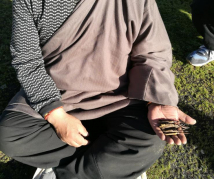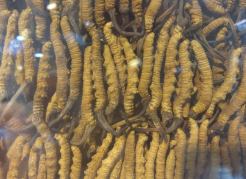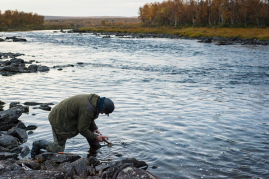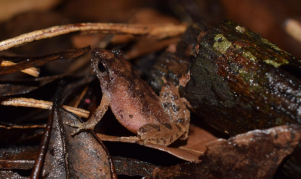Media
International research team led by HKU ecologist
reveals how to manage the global redistribution of species in response to climate change
07 Jun 2017
Climate change will have diverse impacts on natural life across the globe. This fact compelled world leaders to agree to aim for reductions in CO2 emissions to limit future warming in the Paris Agreement of 2015 – an agreement recently in the news again following US President Donald Trump’s decision to withdraw from the climate accords.
One of the clearest impacts of climate change on nature has been the movement of plants and animals or ‘species redistribution’. When species shift their distributions in response to climate change people feel the heat too. For example, if fish species move significantly there could be major disruptions to global food security. Similarly, if important disease vectors (e.g. mosquitoes) change their distributions there could be major public health challenges arising from species redistribution. How best can science support the management of these major climate change impacts on biodiversity and societies?
Leading a large international team of climate change researchers (across several countries in Africa, Asia, Australia, Europe and North America), Dr Timothy Bonebrake, Assistant Professor of Biological Sciences at the University of Hong Kong, and colleagues devised a strategy for managing the consequences of species redistribution. The research team argues, in a recently published paper in Biological Reviews, that with targeted interdisciplinary engagement and by working with managers, local communities and the public, there are significant opportunities to address research challenges in species redistribution and mitigate its effects.
As an example, the research team highlighted the uncertain future of caterpillar fungus (Ophiocordyceps sinensis) and the consequences of its redistribution under climate change. Caterpillar fungus is an important commodity in the economy of rural Tibet and is popular in Hong Kong and mainland China for its use in traditional Chinese medicine. However, scientists have forecasted that under climate change the species may decline. This would most significantly impact the local communities that depend on the fungus for income. Importantly, harvesters of the caterpillar fungus have already experienced local changes in climate in the Tibetan Plateau. These experiences in climate change are crucial and have in fact informed scientific understanding of warming impacts in the region. In this way it is clear that the science and local communities can support one another – it is not only science that supports communities but communities who support science.
Applied, real-time and interdisciplinary research will be vital for effective management of species redistribution effects on biodiversity and societies. “Traditional research paradigms are ill-suited to respond adequately to the global and far-reaching effects of species redistribution” explained Dr Bonebrake. “Ecologists, for example, need to go beyond studying how global warming will change a given species as they did before. Instead, there’s a need to determine whether there are immediate conservation actions that can be taken to ensure that that species persists in the future. We also need to assess whether a given species redistribution will affect associated ‘ecosystem services’, or how that species might be relevant to people, whether it’s through disease, health or recreation.”
The research team provided a number of positive developments which could enhance management efforts. For example, dynamic ocean management systems have been developed in some countries to accommodate seasonal changes in fish distributions and provide for regular updates of management zones. Similar approaches are being developed to adapt to long-term and climate-driven species redistributions. Citizen science has also become very popular in recent years. The involvement of local communities in data collection of species changes allows for a formalized relationship between scientists and the public.
Though the challenges are significant and the consequences of climate change and species redistribution potentially dire, there is cause for optimism. Specifically, the research team demonstrated how ecological, conservation and social research on species redistribution can best be achieved by working across disciplinary boundaries to develop and implement solutions to climate change challenges. “This study came out of a meeting with hundreds of researchers in Tasmania, Species on the Move, and was inspired by the abundance of passion and enthusiasm to address this issue” said Dr Bonebrake. “We realized that by working together across disciplinary lines and by interfacing directly with the communities most affected by climate change, we have the best chance of successfully adapting to the impacts. As an American citizen I was disappointed that President Trump chose to withdraw from the Paris climate agreement. But many cities across the US have decided that they will commit to the agreement all the same. And I think this is the right approach; addressing climate change impacts will require local engagement and I believe scientists have an important role to play in this effort.”
Link of article at Biological Reviews:
http://onlinelibrary.wiley.com/doi/10.1111/brv.12344/full
Link of associated article at Science:
http://science.sciencemag.org/content/355/6332/eaai9214.full
More on the Global Change and Tropical Conservation Laboratory led by Dr Bonebrake:
http://web.hku.hk/~tbone/
For media enquiries, please contact Ms Cindy Chan, Senior Communication Manager of HKU Faculty of Science (tel: 3917 5286/ 6703 0212; email: cindycst@hku.hk ).
Image download and illustration: http://www.scifac.hku.hk/news/media?page=1
Caterpillar fungus accounts for a significant proportion of Tibet’s rural economy. Climate change will likely change the distribution of either the caterpillar, the fungus and maybe both. This will impact the harvesters of the caterpillar fungus (left: photo by Li Liu) and the consumers and sale of the product (right: photo by Shuang Xing in Hong Kong).
Indigenous Skolt Sámi knowledge holder Vladimir Feodoroff cleans a grayling on river Näätämö, in Finland. (Photo courtesy: Chris McNeave, 2017).




